::R5007 : page 123::
THE WORLD’S CONVERSION
—————
REPORT OF MISSIONS INVESTIGATING COMMITTEE, INTERNATIONAL BIBLE STUDENTS ASSOCIATION
AT ITS CONVENTION held September 1-10, 1911, the International Bible Students Association appointed a Committee to tour the world and supply an unvarnished report of the true condition of affairs in Oriental lands amongst the peoples usually termed “heathens.”
The proposition of a certain Laymen’s Missionary Movement to promptly collect $30,000,000 and immediately convert the world naturally aroused the query respecting the possibility of attaining such desirable results. No doubt existed that benevolent people would willingly expend thirty million dollars, and much more, if the results aimed at could be attained. On the other hand, many rumors had been reaching Europe and America respecting the inefficiency of the Missions and Missionaries already in the Oriental lands. These tales possibly had something to do with the falling off of contributions to Missionary Societies. It is the thought of many, however, that the secret of the curtailment of donations to various propaganda is the same as applies to the home work of all Christian denominations. The secret is that the masses of the people, as well as the wealthy, are rapidly losing faith in revealed religion—in the Bible.
The Higher Critics in all of our Colleges and Seminaries, and in the chief pulpits of Christendom, have for fifty years been carrying on a subtle warfare against the Bible. Are we not now beginning to see the fruits of
::R5008 : page 123::
their labors in a general agnosticism? Many manifest their loss of faith merely by a non-attendance at religious services, and by failure to contribute as formerly to religious benevolences. Others are showing their agnosticism by joining Socialism, which many believe is gradually leading them to atheism and anarchy.
Bible Students of the I.B.S.A. are very generally of the opinion that the Bible teaches that nothing short of Messiah’s Kingdom in power and great glory can scatter the thick religious darkness in the world—that nothing short of that Kingdom, as the “Sun of Righteousness,” can scatter the darkness that covers the earth and the gross darkness that benights the heathen. These Bible Students very generally hold that the Bible teaches that the Bride of Christ (the saintly few of this Gospel Age) must be completed, and must by the First Resurrection be glorified with the Redeemer and sit with Him in His throne, before the time will come when Jesus shall enlighten the world.
In other words, “Jesus is the true Light which lighteth every man that cometh into the world.” But, in Divine providence, the world separates itself into two distinct classes. The first and smaller class consists of those “Elect” who have the hearing ear, the understanding and appreciating heart, and the willing mind to be the footstep followers of Jesus, and thus to gain the great prize of joint-heirship with Him in His Kingdom. To these the light of Truth comes now. To others, the non-elect, it will come by and by, when, according to Divine promise, “All the blind eyes shall be opened, and all the deaf ears shall be unstopped.”
EVERY KNEE SHALL BOW
These Bible Students are very generally agreed that the long-promised “Golden Age” of Messiah’s Kingdom is near at hand. Very generally they quote and rejoice in such Scripture promises as, “When He shall appear, we shall also appear with Him in glory.” (Colossians 3:4.) This appearing or revealing will be to the world, respecting whom Saint Paul writes, “The whole creation groaneth and travaileth together until now,” … “waiting for the manifestation of the sons of God.” They quote and rejoice in the promise which declares, “If we suffer with Him we shall also reign with Him.” Gladly, therefore, do they rejoice in tribulations and misrepresentations and whatever Divine Providence permits, knowing that all of these things are working out for them a far more exceeding and eternal weight of glory—in the Kingdom.
These Bible Students have come to very generally understand that the Scriptures teach that Messiah’s Kingdom must first enlighten the world before, “Unto Him every knee shall bow and every tongue confess to the glory of God.” Hence, while sympathetic with all good works, these Students are not expecting the world’s conversion as the result of Missionary effort, and are not disappointed that the eighteen centuries of the preaching of the Gospel has not brought such a result.
——————
This journal $1.00 (4/-) per year in advance. Entered at Brooklyn, N.Y., Post Office as Second Class Mail Matter.
——————
A MESSAGE TO ALL NATIONS
The interest of these Bible Students in the present status of missionary work centers in the fact that they understand the Bible to teach that the preaching of the
::R5008 : page 124::
Gospel in all the world has been eminently proper, not with the expectation of converting the world, but, as the Master said, to give a witness to all the world, and to gather an elect few from all nations, peoples, kindreds and tongues for membership in His Bride class—to sit with Him in His throne during the thousand years, cooperating in the work of uplifting the race as a whole.
Indeed, we understand that one of the principal motives associated with the sending out of the Committee of Investigation was to ascertain whether or not there would appear to be saints in those distant lands, who, as yet, have no knowledge of “the Gospel of the Kingdom,” and of the fact that we are now in the harvest time of this Age, and probably very close to the dawning of the New Dispensation of Messianic glory. It was with this in view that the Association privately authorized Pastor Russell, its President, to spend as much as seven thousand dollars in publishing the Gospel of the Kingdom in Oriental lands, provided in his judgment and in the judgment of the Committee there were saintly hearts and minds in those lands likely to appreciate the message and to be ripened thereby for the heavenly “garner.”
The Committee did not find the time at their disposal sufficient to permit them to visit Burmah, Africa and Australasia. It recommends that another Committee be appointed for that work, and that it have due consideration at the next General Convention of the I.B.S.A. This Convention is announced to be held at Pertle Springs, Chautauqua grounds near Warrensburg, Mo., June, 1-8, 1912.
The gentlemen who have served on this Committee are all earnest Bible Students. Their zeal in the matter of this investigation may be judged from the fact that they not only paid their own expenses, but additionally defrayed Pastor Russell’s and all secretarial expenses. These gentlemen have long been deeply interested in the propagation of the Gospel, both at home and abroad. From the first we thought the Committee a remarkably fair one, and we believe the Report fully justifies that opinion. While it tells some plain truths, and lays bare some important facts, it is in no sense harsh or unkind, but on the contrary, sympathetic.
So interesting is the Committee’s Report and so instructive that we have practically devoted one entire number of THE WATCH TOWER to its presentation. We trust our readers will understand and appreciate our endeavors. We are printing a very large edition of this number, believing that it will be of interest to many outside our present list of subscribers. All such are cordially invited to become subscribers, and to join with us in the study of our Heavenly Father’s Word in its own light—without the “spectacles” of any denominational creed. We can supply a large demand for extra copies of this issue, at 5c. per copy, postpaid, to any part of the world. Tell your friends desiring these to address THE WATCH TOWER, Brooklyn, N.Y. The committee’s report follows:
THE I. B. S. A. COMMITTEE IN JAPAN.
(The Committee Seated.)
Left to right—R. B. Maxwell, Dr. L. W. Jones, Genl. W. P. Hall, Pastor Russell, J. T. D. Pyles, Prof. F. W. Robison, E. W. V. Kuehn.
Japanese and other friends standing.
THE HAWAIIAN ISLANDS VISITED
Our first stop was at the Hawaiian Islands. Our investigations were practically confined to Honolulu, the principal city, but there we were in touch with the general
::R5008 : page 125::
situation throughout the group of thirteen islands. We were astonished to note the degree of civilization manifested by the entire population, composed of Hawaiians, Chinese, Japanese, Filipinos, Koreans, Portuguese and Americans. Of the two hundred thousand population, about seven thousand are Americans or of Caucasian mixture.
Many of the natives live in very cramped quarters, in what is termed “slum districts.” These, nevertheless, are not so much inferior to American slum districts as one might suppose.
We visited a “Settlement,” a philanthropic arrangement of very simple character in the midst of the poor and for their assistance. It has a playground for children, swimming baths, a gymnasium and entertainment room, a dispensary for simple remedies, a kindergarten room, and alongside an apartment for the convenience of consumptives, to whom advice is given respecting the care of their health and the avoidance of the spreading of the infection to their families. The gentleman in charge explained to us that the city of thirty thousand is divided into eight districts, and that eight ladies visit these districts regularly every ten days, and their compensation is from $90 to $100 per month. The sugar planters and principal merchants consider it a good business enterprise to thus safeguard the city against cholera, yellow fever and bubonic plague, and care not that it is under Church control and so accredited.
We visited the Kakemhame School, founded by Mrs. Bishop, a Hawaiian Princess, who became the wife of an American Banker. Her estate maintains the school at an expense of $70,000 per year. Only boys and girls with Hawaiian blood can enjoy the benefits. It is conducted on a luxurious scale, but appears to be of a very practical character and bound to exert a civilizing influence. The school has about 250 pupils, a neat little chapel and the necessary appointments for literary and manual training. The pupils look bright and healthy.
COALING THE SHIP, NAGASAKKI, JAPAN
We also visited the Mid-Pacific Institute. The boys’ buildings are separate from those for the girls. The total number of pupils was approximately 220, and about evenly divided between the sexes. They have their board and lodging and schooling. A nominal charge of $1 a week is made, but nearly all are charity pupils, we were told. They seem healthy and happy. The classes were much smaller than in America. The grading is very similar to that of our public schools, with the addition of excellent homing influences and instruction for the girls in sewing, cooking, etc., calculated to turn them out useful and helpful wives. Our best wish for American and European children is that they could have as good a start in life as have the pupils in the schools we visited here. Nearly all the teachers, male and female, are American, bright and intelligent and above the American average. We did not learn their rate of pay.
“NOW I LAY ME DOWN TO SLEEP” THE NEAREST APPROACH TO RELIGION
We were rejoicing to think that such practical arrangements had been made along humanitarian lines, and it was with considerable surprise that we learned afterwards that nearly all this work is included in the reports of the American Missionary Association and the American Board of Christian Foreign Missions. Nothing connected with the schools gave any indication of their connection with religious or missionary institutions. The only statement of a religious service coming to our attention was that the smaller children knelt by their beds on retiring at night and sang, “Now I lay me down to sleep.”
::R5009 : page 125::
Indeed, we inquired respecting Christian instruction and were informed that the attempt to give it would alienate the pupils and thus cause the disruption of the schools. We were informed that chapel services are held on Sunday, and also Sunday-school exercises, but that comparatively few of the children attend. The only hope seems to be that the civilizing and educating of these children would later on make them more amenable to Christian instruction.
Departing we were invited to speak a few words of encouragement to the pupils of the girls’ school. We sought to impress upon them the advantages of their pleasant and comfortable surroundings, and we connected these creature comforts with the Savior and the influence which doctrine exercises upon the hearts of mankind who properly receive it. We exhorted them to give Jesus a large place in their appreciation and affections. Whether it was imagination or not, it seemed to us that about half of the faces grew dark and scowly while we spoke, and we associated this impression with what the teachers had told us respecting the opposition to everything Christian. Nevertheless, they sang us their Hawaiian farewell song
::R5009 : page 126::
in the natural tongue, which surprised us by its rich and musical qualities.
We visited the Y.M.C.A. in its new building. We learned that its cost, $140,000, was subscribed in six days. It is conveniently arranged for its purposes. In the basement are bowling alleys; on the ground floor, the main offices, a cafe, a reading room, comfortable lounging seats, a room for checkers, chess and dominos, and quite a large room for billiards. On the next floor above is the gymnasium, which is evidently one of the prominent features. Also on this floor is a large room for night school instruction. Above the gymnasium, on the third floor, we understand, there is an auditorium, and also a small room on the first floor for class purposes. The building is in charge of very pleasant gentlemen, who treated us cordially.
It is our opinion that the work in Hawaii is a good one, viewed from the humanitarian standpoint, but an utter failure viewed from the standpoint of Christianization. So far as we could discern, faith in the Redeeming blood of Jesus, in His resurrection and in His coming Kingdom have never been taught. But alas! this is becoming too true in Europe and America and amongst Christian people of all denominations. Only comparatively few any longer sing understandingly, “In the Cross of Christ I glory.”
A gentleman who had resided in the city for forty-two years remarked that in his opinion the Hawaiians are retrograding, are less reliable, less temperate and less moral than they were twenty-five years ago.
Mr. Leung Kan To, Mr. Li Sin Hong, Rev. Fok Tsing Shang, Pastor Russell, Prof. Nz Tinpo, Mr. Cheung Chuk Ling, rev. Chan Kwin Hoi
REPORT ON MISSIONARY WORK IN JAPAN
We found the Japanese a very interesting people. We traveled nearly seven hundred miles through Japan, and visited various cities aggregating four and a half millions of population, which is about one-tenth of the entire population of Japan. We found the people industrious, peace-loving, polite and kind to each other, and towards foreigners. Although our visit was in the holiday season, when, according to their custom, over indulgence in liquor would be pardonable, nevertheless our entire party, scattered for the purpose of wide observation, noted only twelve intoxicated persons, and three of these were Europeans. Parental love and care were in evidence everywhere. We heard not a harsh expression from parent to child, nor to any one, and witnessed only one altercation, and it trivial. Everybody seemed industrious, minding his own business, and happy. Our united comment was, Would to God as favorable conditions prevailed in Europe and America! We noted nothing resembling profanity, and upon inquiry were told that they use no profanity, and that their strongest expression is “beka”—fool.
We did not, however, conclude that the fretfulness, unhappiness, quarrelsomeness and rudeness and boisterousness frequently in evidence in Europe and America are attributable to Christianity. On the contrary, we surmised that Divine Providence had sent the message of the Gospel in the direction of the more rude or combative race, which received the letter and form of Christianity in a measure, without generally entering into its spirit of meekness, gentleness, patience, long-suffering, brotherly kindness and love. Our comment further was that if the Japanese should receive the letter of the Gospel and its spirit they would have less difficulty than the Europeans and Americans in the development of the fruits of the Spirit, because naturally more disposed toward gentleness, patience and brotherly kindness.
WHAT OF THE MISSIONARY EFFORTS?
These observations of the Japanese gave us the keener interest in our investigation as to how much, if anything, Christianity has to do with these conditions, to what extent Japan is Christianized, etc. Our findings in the matter at Tokio will serve to illustrate. Our Committee attended
::R5009 : page 127::
nine religious services, besides the two addressed by Pastor Russell. The average attendance at the nine meetings was 59, the smallest being 9, and the largest 250, including the ministers. Two of these services were in the English language; the others were in Japanese and addressed by Japanese ministers. One of the sermons in the English tongue was along the line of Evolution. Although many Japanese understand English they rarely attend preaching in that tongue. We saw but one Japanese at the two English services and he, apparently, was a servant in waiting. We were very agreeably surprised to note the deeply reverential attitude of the majority of those attending the Japanese services, and that fully two-thirds were males. We congratulate the laborers in this missionary field on the devout appearance of the 431 Japanese worshipers observed by us at the seven meetings referred to. Of course, it is impossible to tell accurately the attitude of the heart from the outward demeanor, but reverential attitude and attention should count for considerable.
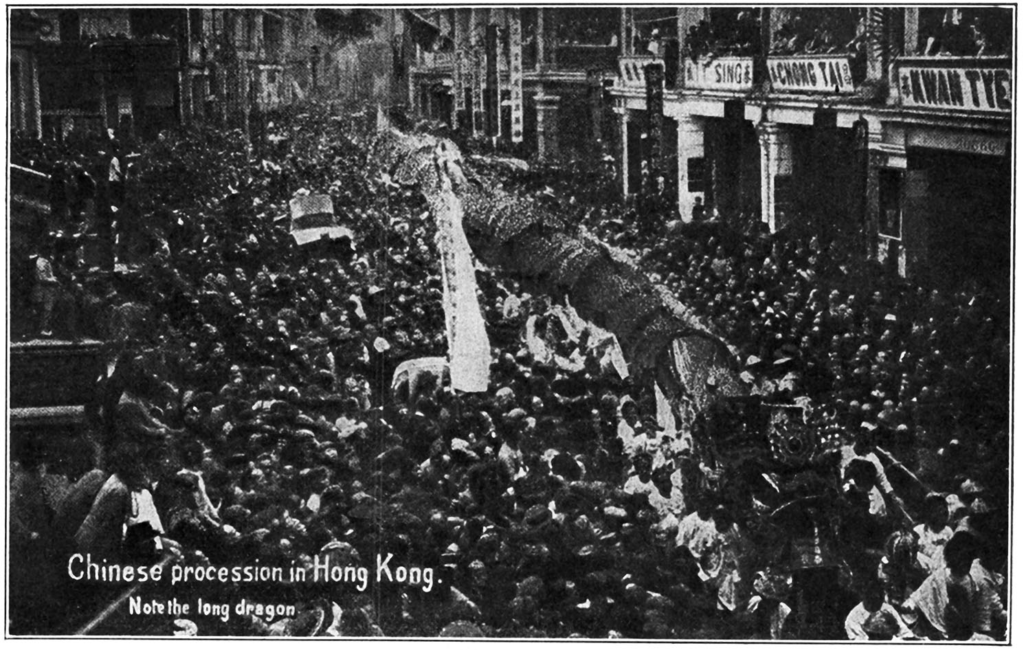 STREET PROCESSION IN HONG KONG—CARRYING A DRAGON
STREET PROCESSION IN HONG KONG—CARRYING A DRAGON
ENCOURAGEMENTS AND DISCOURAGEMENTS
It was plainly evident that the Missionaries are feeling a considerable degree of discouragement, nor can we blame them. So far as we could learn their work made considerable progress until twenty years ago, since which time a wave of unbelief has swept over Japan, just as in Europe and America. Today the Japanese minds, like the minds of their European and American cousins, are full of interrogation points. In other words, the spirit of agnosticism is more and more prevalent. It is affecting the Missions and their work, and also affecting Buddhism and Shintoism. Although Buddhist temples, recently built, are gorgeous affairs, and although a million dollars has just been raised to build a new Buddhist temple near Yokohama, nevertheless, it is admitted that Buddhism is on the wane—that the number who attend the temples to pray and worship are fewer than formerly, and generally of the more ignorant classes.
The present trend of the Japanese religious sentiment is toward infidelity, doubt and atheism. An inquiry as to the religious sentiment in three of the Japanese schools (University of Tokio) recently showed the following religious census:
Christians, 4; Buddhists, Confucians and Shintos, 17; noncommittal, 46; atheists, 60; agnostics, 282; total, 409. This is a terrible picture, true also, we fear, of many colleges in America and Europe.
Christianity in Japan is in much the same condition as in America and Europe, in two respects. (1) A certain number are true worshipers, devout believers, but they are few. (2) A larger number associate for the advantages they gain in one way or another—as, for instance, the privilege of night schools, Y.M.C.A. gymnasiums, etc., etc. There is considerable sympathy for Christianity amongst those who are at heart agnostics, and who class Jesus as a great teacher along with Confucius and Buddha, but who see nothing and know nothing respecting His redemptive work. These realize that Christianity has been helping on in the work of Japanese civilization, and would be sorry to know of anything calculated to hinder the work of the Missionaries. Christianity and all other religions in Japan are on the defensive.
JAPANESE DEMAND PROOFS BEFORE ACCEPTING DOCTRINES
The active minds of the Japanese know that Buddhism cannot answer their questions respecting God and the future, and they come to the Missionaries and native Christians with questions, for which they have as yet received no satisfactory reply. In consequence, they are holding aloof and saying, There is some good in all religions, perhaps, but apparently all of them have more or less of error and superstition. We will take advantage of the kindly interest of these foreigners in our welfare. We appreciate the fact that they have invested millions of dollars in churches and colleges in our land. We are confident they have done us good and helped to some extent to break from us the shackles of religious superstition. We will attend their schools and avail ourselves of their kindness, and endeavor to show a kindly disposition toward them; but we do not believe in Jesus as a Savior; we merely recognize Him as a great teacher. We think, therefore, that it is unnecessary that we should be baptized. We see not how this would have anything to do with our character. The fact of the matter is we believe we get as good moral teaching from Buddhism as from Christianity. We will stand aloof, doubting if there is any positive truth on these subjects. Thus it will be seen that the attitude of the Japanese toward Christianity
::R5010 : page 128::
is very much the same as the general attitude of the public throughout Christendom.
We should note that considerable educational work is being carried on at Tokio by the Methodist brethren. Dr. Spencer informs us that they have an attendance of about 350 girls and 550 young men in their college. They seem to be well equipped. We could wish that the youths of the middle and lower classes in Europe and America were as well provided for.
The Missionaries themselves appear to be an earnest band, but considerably discouraged. And no wonder! Outsiders report that they have considerable denominational conflict and jealous competition, but that steps are now being taken for a general religious Federation. The Missionaries freely admit that in their schools and other work it is necessary to lay stress chiefly upon moral conduct and to say little or nothing about Jesus’ redemptive work and other doctrines—otherwise they would lose their hold upon the pupils, who evidently attend the schools chiefly for the educational advantages they offer. We repeat that the Missionaries of Japan have our congratulations upon the work done years ago and our sympathy in respect to the discouragement of the present, and the unfavorable outlook. What the Japanese need is “the Gospel of the Kingdom,” announcing the second coming of Jesus as the Messiah of Glory, to rule, heal and instruct all the families of the earth. Pastor Russell’s sermons gave them more food for thought than they had ever before enjoyed.
THE CONDITIONS AND OUTLOOK IN CHINA
At no place were we able to penetrate beyond 125 miles inland in the great Empire of China, of 320,000,000 people. But directly and indirectly we visited and inspected the conditions of life in about fifteen cities and villages, whose combined population was about 4,000,000. We saw many sad sights and heard many sad stories, but also both saw and heard other things which comforted and encouraged us.
We were specially impressed with the business faculties of the Chinese, with their energy and general contentment, and, alas, also impressed with the filthiness and unsanitary conditions in which we found them in their large cities. Both young and old, male and female, work, and apparently willingly.
China entire may be said to be revolutionized; few apparently have any sympathy with the Manchu Dynasty, which has just abdicated. The remarkable thing is that the revolutionists, hampered for lack of money, have been able to accomplish so much and to have preserved order so well. True, lawlessness has in several instances gained the upper hand; and, of course, it is still possible that the entire social fabric may be destroyed. There is a reason, however, why this seems improbable: For long centuries the various provinces of China have maintained a kind of local autonomy, not unlike that of Canada and Australia in respect to the British. These provinces or states have long had states rights, slightly after the fashion of the American Union.
MISSIONARIES IN CHINA
Without doubt missionaries have accomplished considerable in China. It is difficult, however, for the Chinese to differentiate between Christian missionaries and Christian tourists, Christian soldiers and sailors, Christian merchants and tradesmen and Christian clergymen who preach to such of these as attend Divine service. Gradually, however, we believe they are getting a proper focus upon the matter. We must sympathize with them in this; if we could put ourselves in their places, how strange it would all appear to us! The aloofness of the foreigners and the disdain with which they usually treat the natives is quite unfavorable also to true Christian progress here. Moreover, although the Chinese are aware that some good people are sending large sums of money in their interest, building colleges and hospitals and churches and schools and Y.M.C.A. buildings, with gymnasia, billiard rooms, bowling alleys, etc., they find it difficult to harmonize this benevolence with the fact that foreigners all conspire to keep wages at the lowest point—hindering as much as possible any advance in prices or such improvement in conditions as would raise prices.
Under all these conditions it seems remarkable to us that Christian missionary effort has accomplished so much as we perceive. It seems the more amazing when we reflect on the Gospel message which Christendom has had to offer, namely, that only the saintly few have the slightest prospect of heaven, and that all the vast remainder of China’s hundreds of millions and their forefathers are doomed to an eternity of torture.
But with all this handicap we found some Chinese Christians who gave every evidence of deep sincerity. Some foreigners, however, told us that they were merely “rice Christians.” This may be true of some, but we feel sure it is not true of all—nor even of a majority. Comparing the native congregations with Christian gatherings in Europe and America, we have every reason to believe that the comparison favored the Chinese. They listen more respectfully, reverentially and earnestly than do the majority of congregations in Christian lands.
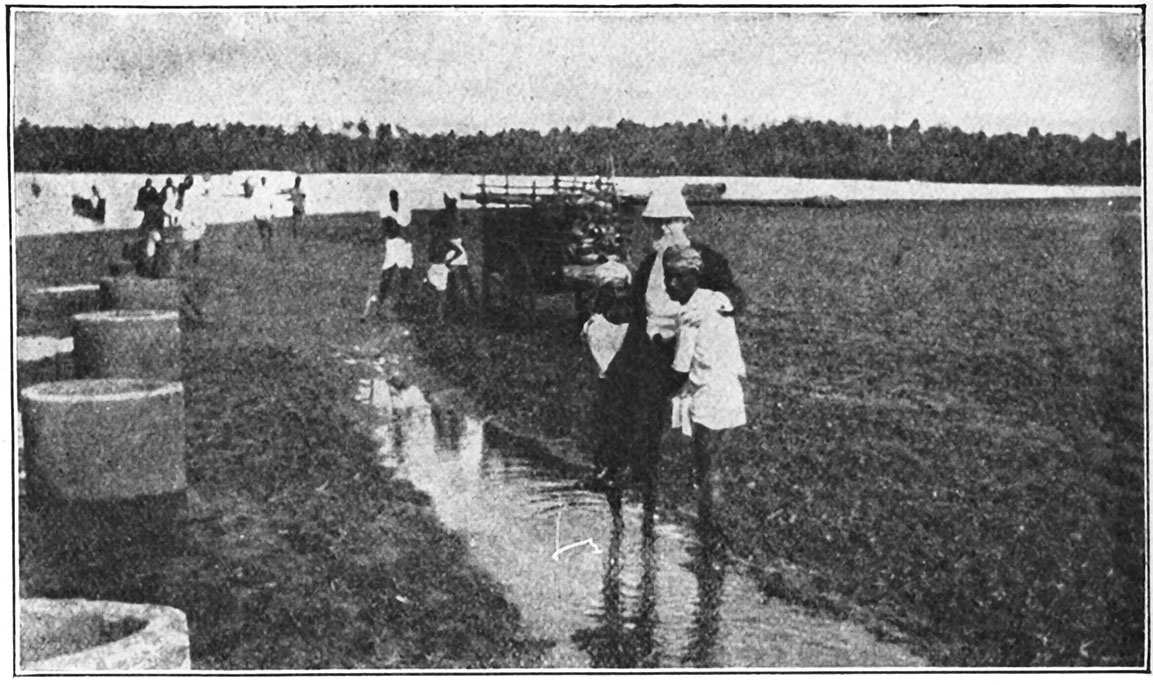 PASTOR RUSSELL CARRIED BY NATIVES TO A BOAT, EN ROUTE TO ADDRESS BY REQUEST OF A PARSEE SUPERINTENDENT, THE COLONY OF 291 LEPERS AT LEPER ISLAND, COLOMBO, CEYLON.
PASTOR RUSSELL CARRIED BY NATIVES TO A BOAT, EN ROUTE TO ADDRESS BY REQUEST OF A PARSEE SUPERINTENDENT, THE COLONY OF 291 LEPERS AT LEPER ISLAND, COLOMBO, CEYLON.
THE OUTLOOK
The outlook is both favorable and unfavorable. It is unfavorable in that China is now coming under the influence of Higher Criticism, Evolution, etc.—not from the missionaries, however, who seem to be more loyal to the Bible than are the ministers of Christendom. This flood of infidelity is coming from Japan.
The slowness of the Christian progress in China of late may be judged from the report of one Y.M.C.A.
::R5010 : page 129::
secretary from America. He said that in ten years the Association had succeeded in bringing only 25 persons into membership with the different Christian churches of all denominations. And the Y.M.C.A., be it remembered, is chiefly a moral club dominated by Christian influence—much the same as in Europe and America—and apparently the chief recruiting ground for the churches.
So far as we were able to sense the situation from the missionary viewpoint it is this: The influence of Christianity has brought a measure of enlightenment to the Chinese which led up to the recent revolution. The revolution itself is dominated by the Christian Chinese, partly because they are the more intelligent. The solid front which Chinese religions have heretofore maintained is breaking. Buddhism, Taoism and Confucianism still dominate the masses, but many are saying, We are non-sectarian; we take the best of all these religions and admit that there are good things also to be said respecting Christianity. The progressive Chinese of the revolutionist party proclaim that henceforth China shall be known as one of the Christian nations. By this they do not mean, however, that the Chinese will be converted to faith in Jesus as the Redeemer of the world and their personal Savior, but merely that China recognizes that the nations which call themselves Christian, are more wise, more intelligent, less superstitious, better educated and better warriors than the nations which recognize Buddhism, Brahminism, Taoism, Mohammedanism, etc. The statement, therefore, simply means that the Chinese propose to adopt Occidental manners and customs and, so far as possible, Occidental lines of thought.
DIFFICULTIES SHOULD BE PROMPTLY REMOVED
But while the psychological moment for the spread of Christianity would appear to have arrived, there is a difficulty. The Chinaman is perplexed by the 600 different denominations of Christians and the 600 different theories of salvation which they represent. Once awakened to thought he is more critical, if not more logical, than the masses of Christendom in respect to what he will accept instead of the doctrines he proposes to drop. He asks the missionaries all kinds of questions, the majority of which receive no satisfactory answer. One of the principal difficulties is on the subject of the Trinity—how there could be one God and He of three different persons, or how there could be three different Gods and yet these three be only one person; and how the one God could be dead for three days and raise Himself from the dead. The Chinese mind seems unable to grasp this mathematical problem.
As between the Protestant Hell and the Catholic Purgatory, the Chinaman is also perplexed. He wants to know where Hell and Purgatory are located, and who knows and how he knows. He seems perplexed to understand how a just and loving God should bring so many people into existence for such a fate. While Christianity appeals to them in some ways, it repels them along these lines; the poor Chinese are really in a quandary. The trend amongst the more thoughtful ones seems to be to consider all religions as more or less superstitions, useful merely for the control of the more degraded and vicious.
In view of these limitations, the missionaries now find it inexpedient to discuss doctrinal matters. Instead, the chief attention is given to schools, colleges, hospitals, Y.M.C.A. privileges, sports, etc. Their hope is that this beneficial influence may gradually attract more and more the Chinese, and that thus will spring up a preference for Christian methods and places of worship over and above
::R5011 : page 129::
those of other religions.
WHICH IS THE RIGHT SHIP?
One missionary likened the Christian church and its salvation to a large ship: The passengers board the vessel in confidence, trusting all to the officers, and do not study the maps, charts and compass nor inquire particularly respecting the machinery. So all desiring to be saved, he said, should get into the Church and live and rest there contented, without inquiring particularly into doctrines, trusting implicitly to the final outcome.
But some of the hearers inquired, Which boat—which church? Are there not many Christian boats, Catholic and Protestant? Which one will surely be properly navigated and bring all of her passengers to the heavenly port?
ONE OF THE WELCOMING BANDS WHICH ESCORTED THE I.B.S.A. COMMITTEE IN TRAVANCORE, INDIA
Such knotty questions are, of course, perplexing to the missionaries, unused to such close reasonings in their own lands. We sympathize with the missionaries, realizing that they are in a very difficult situation. In conversation many of them manifested great earnestness and real piety and deplored their inability to accomplish greater results along religious lines. Others, a minority, we hope, seem to have a narrow and hypocritical spirit. Sent to convert the heathen they would like to make such reports as would please and not discourage those who sent them forth, especially in view of the fact that the Home Secretaries write them that donations are falling off and that encouraging reports must be made.
Much has been said respecting the fact that the missionaries live in palatial residences and hold themselves so aloof from the people whom they would interest that the latter discount all their professions of love and sympathy. Having heard such reports we sought to determine whether or not they were truthful, and, if so, the cause. We did find palatial residences of ministers in Hong Kong and Shanghai, but these were not, strictly speaking, missionaries who served the Chinese. These ministers serve and are chiefly supported by Americans, British, Germans, etc. (merchants, consuls, military officers, etc.). One of these serves the Union Church in Shanghai at $2,400 gold ($4,800 Chinese money) per
::R5011 : page 130::
year. Of course, out of this he can well afford to live quite luxuriously in China. It is true that the missionaries also live in compounds, near the college buildings, separate entirely from the natives. These substantial structures, of course, must appear to the natives as palatial, greatly in contrast with their own hovels.
But we have not the heart to blame Western people for desiring to live according to their own standard when it is possible. No doubt some of them would serve with equal zeal if they had nowhere to lay their heads superior to the native house-boats on the river or the hovels on the shore. As one of them very frankly said, The constant din and hum of voices from earliest morning till latest night is very wearing upon the more delicate nervous systems of Caucasians and calculated to bring on nervous prostration, hence the better houses, purer air, better food, etc., may be considered almost in the light of necessities. Nor can we suppose that those who sent forth the missionaries and are paying their expenses desire them to live on the same level as the Chinese, even if their health would permit. On the whole, the average missionary seems to be doing in this respect about as faithfully as the majority of Christian people and Christian ministers in their home lands. So far as their clothing is concerned, we saw nothing that would be considered extravagant, even though much superior to the poor toggery of the majority of the natives.
THE RED CROSS SOCIETY
We have for years heard much of famines and consequent pestilences in China and these have usually been reported from practically the same district—the valley of the Yangtse River, which is navigable by large vessels for 900 miles. There is no doubt about the distress; many of the poor people are in a very pitiable condition. This is the third year in succession in which they have suffered famine. Even the seed sown was lost by reason of the great freshets. It is safe to say that two millions are on the verge of starvation—many have already starved to death. Money and rice from America have been poured into this district time and again, giving a moiety of relief, but the cause of the trouble remains—the river conditions.
HINDU TEMPLES AND MOHAMMEDAN MOSQUE
The American Red Cross Society, organized for the preservation of life, and having as its President the Honorable William H. Taft, sent engineers to look into the difficulties and to confer with the Chinese Government respecting a permanent remedy. It has required time to make surveys and for engineers to decide what is necessary. The matter had reached a satisfactory conclusion and work was about to be begun when the revolution interrupted. It is anticipated that the new government will take the matter up. The engineer in charge, Mr. Jameson, informed us that he hopes to put to work speedily on the necessary improvements 30,000 of the destitute, and thus help a little in stemming the famine difficulties. While the matter is not under missionary auspices, it nevertheless has, in the minds of the Chinese, a missionary association and a helpful influence. Indeed, it is only along the lines of higher civilization that any considerable work can be accomplished now in China. Nevertheless, the Chinese are awakening and, like the Japanese, are wanting a new religion, rational as well as reverential. Is it not the same in Europe and America?
BATHING GHATS—BENARES, INDIA
Pastor Russell addressed the natives on two occasions. Considerable interest was manifested and Chinese reports of both discourses were published, the publishers proposing to continue such publications weekly after the manner of the American and British newspapers. Something in his presentation seemed specially to strike interest and convince many of his hearers. In response to an offer of free reading matter in English, many addresses were handed in.
THE MORALS OF CHINA
The Chinese moral standard differs considerably from ours, but they apparently respect their own; there is no obtrusion of the nude and lewd. We saw no immodest dressing—nothing to suggest impurity or licentiousness. Mr. Lerrigo, Secretary of the Canton Y.M.C.A., informed us that the Chinese of the Association had recently purchased a moving-picture outfit, but that they immediately objected to the immodesty of some of the pictures, which would be thought all right in Europe and America. A censorship committee was appointed, and every picture in the slightest degree immodest is eliminated. In their Christian gatherings the sexes sit apart. When we sought for photographic views representing the Chinese, their customs and homes, we found them all modest, chaste. Vulgar, foolish and immodest pictures there were on sale, but they were of European manufacture, and apparently sold to Europeans and Americans. A missionary of thirty years’ residence assured us that the moral status of the people in general is quite good, excepting that of the Buddhist priests.
UNITED STATES MISSIONS
Our visit to the Philippine Islands gave us a greatly increased respect for the American flag. The change wrought in the twelve years of American supervision of the Philippines is little short of a miracle. Little did we
::R5011 : page 131::
suppose that our Government had been carrying on so benevolent a work as we there beheld. True, it is not a missionary work in the proper sense of that term, in that it is not attempting to give the Filipinos religious instruction of any kind. Nevertheless, the work is very similar to that which all Foreign Missions are now attempting in Oriental countries—a work of education and moral and social uplift, etc. The officers and soldiers whom we met were a credit to the greatest nation in the world, including the Major General commanding the forces of the Philippines, the Civil Governor and those of the civil service officials with whom we became acquainted.
When our Government took over the control of these Islands from Spain there were thousands of Jesuits and Friars in the Islands in control of vast estates, but the people were ignorant. These friars still own 95 per cent. of the property within the walled city of Manila, we were told. The Government rents from them considerable property, paying $4,000 gold rent per year for one building alone. Nothing has been done by the United States Government against Catholicism; no Protestant denomination has been favored in any manner. Instead a thousand American teachers were imported, of whom 800 still remain. These are now supplemented by 6,000 native teachers. The Filipino thirst for education is rapidly increasing. The Legislature has recently determined upon the erection of 400 new school houses and the addition of many teachers. Do you have compulsory education? we inquired. The answer was, It is unnecessary; we cannot equip the schools rapidly enough as it is; we are obliged to run two shifts in order to accommodate those who are anxious to learn.
An up-to-date hospital has been erected; it is probably as complete as any hospital in the world, and its free dispensary has the distinction of being sixth in the world’s record of cases treated in a year—80,000 cases last year.
Steam railways, electric railways, etc., with modern buildings and a newly dredged harbor are rapidly increasing the business interests and lifting the people from serfdom and peonage to intelligence and good citizenship.
THE WELCOME
Crowd en route from Travendrum to Russell-Purim Meetings.
::R5012 : page 131::
UNITED STATES TREATING FILIPINOS AS AN ELDER BROTHER
To give an idea of the progress made, we note the fact that at a meeting addressed by Pastor Russell there were present about 1,000 Filipino young men, ages from 18 to 30, who understand English, and who gave the very closest attention. Following the address some 300 applications for literature were voluntarily handed to Pastor Russell. This is in keeping with the general manifestation of this people for knowledge along every line. Another indication of their progress was manifested recently. A proposal was made that a Y.M.C.A. for Filipinos be established. The American Central Committee made an offer of $140,000, provided the Filipinos of Manila themselves would raise $80,000. The amount was more than subscribed—$100,000 was contributed.
CROWD WITH BANNERS ESCORTING PASTOR RUSSELL PARTY, TRAVANCORE, S . INDIA.
Camera caught the Pastor’s head and the straps of the autocar.
To our surprise, the Governor General and others assured us that all of these improvements are being made by the Filipinos themselves—at their own cost. The United States Government merely supervises the matter through its representatives. The judges, physicians, nurses, teachers, schools, are all paid for out of Filipino funds under our Government’s wise and economical management of their affairs; as an elder brother doing for a younger. We felt proud indeed of the record. When we contrasted the results here manifested and the benevolent methods used with the selfish exploiting practices only too common, we thanked God that whatever the blemishes of our Government and whatever its shortcomings, it has a record for justice second to none ever made in this world’s history, and that without hypocrisy.
This fairness manifested by our Government is telling upon the Filipinos, who at first misunderstood. It is also influencing the large number of Chinese residing there. Indeed, the whole world is taking notice; but alas! we fear that no colonizing nation is ready to follow the example. The peoples of the Orient are practical and nothing could much more commend to them the principles of Christianity than our Government’s course. Quite to the contrary, the operations and exploitations of European governments have given the missionaries a very uphill work in what they have sought to do. The very fact that these exploiting governments have backed up and protected
::R5012 : page 132::
the missionaries has had, we believe, an influence derogatory to missions.
THE MALAY PENINSULA
Your Committee visited Singapore and Penang and had interesting and profitable experiences. The greatest missionary effort in both places appeared to be under Methodist control. The work being done in these two Malayan centers reminded us very much of what we have already mentioned respecting the work in progress in the Philippine Islands. Like that, it seemed to be chiefly a work of secular education, and quite successful, although conducted along different lines. The Government subsidizes the schools liberally, besides which a tuition fee is charged. In these respects we believe the work less successful than that in the Philippines, where the education is free, and where the Government provides the schools and teachers and cannot supply them rapidly enough.
These Methodist schools in Singapore and Penang, so far as we were able to learn, have 2,500 and 2,000 pupils respectively in attendance, and with Government subsidization, are self-supporting. These pupils are attracted from all parts of the Peninsula, and some from Siam and from Sumatra, across the Straits. Naturally the expenses attaching to these scholarships must reduce the number in attendance and confine it to the comparatively better-off classes. In the Philippines, on the contrary, the free schools and their teachers are scattered everywhere, and all people, rich and poor, have educational opportunities. While, therefore, we highly commend the work being done here, we still believe that the American plan is the superior one. It is astonishing to note how anxious the peoples of these parts seem to be to gain an education.
Inquiry respecting Christianity amongst the students revealed the fact that a certain amount of religious matter is introduced daily, in that the sessions are opened with prayer, and some of the simpler Bible stories and parables are brought to the attention of the pupils. Of course, only a small proportion of the entire attendance at these schools ever take the full course of instruction, but we are informed that one-quarter of those who do graduate profess Christianity, as preferable to the religion of their birth, although they do not very generally join any of the Christian churches. We were glad to learn that here, as well as in China, prejudice against Christianity is rapidly breaking down, and that the Chinese who predominate here prefer American and English teachers rather than their own. Indeed, they are quite willing to pay good salaries for competent teachers, who are in demand.
We did not have favorable opportunities for contact with the native Christians, who are of many nationalities. We learned with pleasure, however, that while they are few in number, they give evidence of sincerity. Other denominations were represented as active, but in a much smaller way, and much less successful than the work noted.
CHRISTIAN INFLUENCE IN INDIA
For centuries India has been a missionary field—particularly the southern portion, and the Island of Ceylon adjacent. Tradition has it that St. Thomas, one of the twelve Apostles, visited Ceylon and Madras. A cathedral to his memory stands in Madras, covering, it is claimed, his grave. The legend is quite specific. We were shown the cave where he was attacked by the Brahmins, but from which he escaped. About two miles from it is what is termed Mt. Saint Thomas. This is the place where, supposedly, he was speared to death by a Brahmin. Of course, these incidentals may have belonged to some other man by the name of Thomas, and centuries of time may have confounded him with the Apostle Thomas. But that some man by the name of Thomas, a Christian Missionary, visited those parts long ago could scarcely be questioned.
RUSSELL-PURIM, TRAVANCORE, INDIA.
Pastor Russell Surrounded by Native Helpers of I. B. S. A.
Additional tradition shows that at a very early period Syrian Christians made a settlement on the southwest coast. They still maintain an organization, and a church history running back from twelve to fifteen hundred years, and they now number about a quarter of a million in the Province of Travancore, whose population is about three millions.
The London Missionary Society, a Congregational institution, has carried on a work in Travancore since 1806. They have had some success, almost exclusively with the lower castes, some of whose forbears were slaves. They claim now a church membership of ten thousand. Although Travancore is one of the smallest of the India Provinces, we have given it prominence because Christian missionary effort here appears to have reached a better development than elsewhere, so far as we could discern. The natives are very poor, but industrious, and apparently honest-hearted. The higher castes, which adhere to Hinduism, seem not averse to Christianity, but reject it, because to them it seems less logical than their own beliefs. The natives from the lower castes, reached by the Gospel message, have certainly been blessed above their fellows still remaining under the grosser superstitions and idolatry of Hinduism.
Northward from Travancore and Madras we found evidences of missionary activity, but they were newer and their successful work correspondingly less in evidence. We were pleased, however, to note that some amongst the natives in all parts give evidence of great sincerity and Christian devotion to the extent of their knowledge of the Lord and His Word. These, however, of course, are very isolated cases, just as this class of Christians is scarce in every part of the world.
METHODS EMPLOYED TO INTEREST NATIVES
Various are the methods used by the Missionaries to gain a hold upon the people of India, and to lift them from idolatry and superstition. The college appears to be the most attractive bait. There is a thirst for knowledge, even though it be less in India than could be wished for. In only one locality did we hear of children being hired to attend school by the payment of a trifling sum. We were told that for this inducement the parents would compel
::R5012 : page 133::
the attendance of the children, but not without it. In various parts of India there are academies and colleges controlled by the Missionaries. These are attractive to the young men, because of the educational facilities. The students are not required to make any profession of Christianity in joining the schools, but rather are assured that no attempt will be made to indoctrinate them. These students, we are advised, come largely from the upper Brahmin caste, influence with which is much coveted by the Missionaries.
Inquiry as to how Christian interest was sustained amongst these young men brought the answer that the majority, after graduating, scoff at Christianity, and claim a superiority for Hinduism. They seem to catch in the schools the spirit of “Higher Criticism.” We cannot surely tell the mental attitude of these young men when they enter the schools, because we know that the influence of the schooling in the colleges in Christendom tends to similar unbelief in the Bible. Inquiry respecting the status of the Protestant Missionaries on the subject of faith in the Bible brought the report that many of them are Higher Critics and Evolutionists, who no longer believe in the Bible as the inspired Word of God. It seems to be conceded, however, that higher critical teachings are not conveyed to the scholars in a public manner, but
::R5013 : page 133::
rather, as in Christendom, covertly.
We found evidence of very sincere Christian endeavor on the part of the Missionaries in the past, with some fruitage in consecrated natives. We found the Missionaries of the present time earnest and attentive to their work, but, like ministers of Christendom, they seem to have had their spirituality sapped, devitalized, and, probably, by the same influences—”Higher-Critical-Infidel-Evolutionary” theories. Only one missionary did we hear of preaching eternal torture, and he was a new arrival on the field. Contact with “heathendom” seems to fully settle in the minds of all reasoning people that God never intended the eternal torture of all except the comparatively few who put their trust in the redemptive work of Jesus, and subsequently seek to walk in His steps.
SINCERITY OF MANY NATIVES EVIDENT
On every hand may be seen evidences that the poor Hindus are as sincere at heart in their worship as any Christian could possibly be. There is not the slightest sign that the devotions of the majority are hypocritical—”to be seen of men.” Although their devotions are performed publicly, fearlessly, they are reverential and seem to be addressed to some unseen god, even though crude idols are at times apparently used to represent him, according to a philosophy which we are unable to appreciate. However, when we remembered the terrible mental pictures of the Almighty drawn by some of our creeds, and contrasted these with the ugly idols worshipped by some of these poor peoples, we felt inclined to say that of the two the creed idol was the more repulsive.
MORE WHO WELCOMED THE COMMITTEE.
The Salvation Army has recently entered the missionary lists in India. Its sympathetic method of mingling with and aiding the lowest caste to better ideas of home-life and cleanliness is commendable. If only their fifes and drums called the people to hear of God’s love, and the good tidings of His provision for all in Messiah’s Kingdom, what good they might accomplish! They are making quite a show of success by attracting to their service young teachers, “catechists,” from other missions, by more liberal allowances for their expenses.
MORE THAN EDUCATION NEEDED TO LIFT NATIVES OUT OF SUPERSTITION
At Benares we had a Christian native for a guide, and he informed us that many of the poor people who were bathing in the Ganges, and hoping thereby to wash away their sins, had been educated, some of them in Christian schools, so that quite a good many of them were conversant with the English language. This surely was a very discouraging discovery. It indicated that even more than education is necessary to lift these peoples out of their deep-seated superstitions.
Missionaries and Christianity have frequently been blamed with doing injury to the people. Many say, “You can trust a native who has not professed Christianity, but beware lest you ever trust one who has been Christianized—they are not dependable.” It may be that something connected with Missionary effort promotes dishonesty in those who receive its benefits, but in our opinion the Missionaries and their methods are less to be blamed than the Europeans residing in India and transient visitors. Apparently the more consecrated people of Christendom remain at home. There can be no doubt that the influence of the white man in a general way upon the people of India has to a considerable extent been demoralizing, and this demoralizing influence, exercised by representatives of Christendom, seems to more than counteract the helpful influences of the Bible and the Missionaries. The natives of lower castes look up to the whites, but find their disgraces easier to copy than their graces.
In Madras we became acquainted with a native Christian worker who was conducting a temperance mission. We remarked that we had been greatly surprised to find the natives quite free from the influence of intoxicating liquors, and that we were surprised at his having a Temperance Mission. He corroborated our understanding of the matter that Hindus and Mohammedans, who constitute the bulk of the population, repudiate intoxicating liquors. He said that his labors were chiefly amongst the young natives who were influenced by Christianity, and who were rapidly becoming addicted to intoxicating liquors. We learned also that amongst the Mohammedans there is a class increasingly numerous which, following the example of the whites, are becoming skeptical of religion and correspondingly dissolute in their
::R5013 : page 134::
habits. As for the whites, nearly all seem to use liquors and tobacco. The irreligion and nominalism of the majority of the whites discount greatly all missionary efforts.
A REVIEW OF THE COMMITTEE’S TOUR
The Committee traveled in India about four thousand miles altogether—by railway, bullock-carts, automobiles, pony-carts, jinrickshas, carriages, etc.
From the Straits of Malay our party came to the Island of Ceylon. We had some interesting experiences in its chief city, Colombo. A number of Bible students of that place met us on our arrival, and gave us hearty greetings of welcome. Our fellowship with them was sweet, and three of them subsequently accompanied us for a few days through the Travancore District of India. Here in Colombo a meeting had been arranged for in the Public Hall, to be addressed by Pastor Russell. Although the hour appointed was early, the house was crowded, about 900 being present. Close attention was given, and at the conclusion of the meeting many addresses were handed in for literature on Biblical topics.
Another interesting experience worth relating was a visit by the Committee to the Lepers’ Hospital on an island adjoining the city. The hospital is presided over by an educated Indian of the Parsee faith, who with great cordiality arranged for Pastor Russell to give an address (through an interpreter) to the lepers. Many heard with interest, and amongst them some inquired for literature.
TRAVANCORE PROVINCE—INDIA
A full week was given to southwest India, and it was worthy of it. Our first stop was at Russell-Purim, the principal point at which Brother Davey for two years has let shine the “Gospel of the Kingdom.” Pastor Russell preached there twice through interpreters to audiences variously estimated from two to five thousand. Nearly two miles from the meeting place we were met by a thousand of the natives who escorted us to a hastily improvised auditorium. A fife and drum corps preceded us, while behind us came bagpipes, tom-toms and various musical instruments unknown to us. Many of those who met us carried banners of welcome and marched ahead of our motor car, while on either side were lined up others who greeted us, singing native hymns of welcome. Our Committee was quite unprepared for such a reception, and in the general din could merely express our appreciation by bowing to the multitudes who walked and ran before, beside and behind us to the meeting place, constantly joined by other hundreds on the way, and finally by thousands who were waiting for us at the auditorium.
When we stepped upon the platform each member of the Committee was presented with a garland of flowers, strung after the native style. These were hung about our necks. To each of us was presented also a bouquet of flowers handsomely arranged in a manner which, we were informed, to the natives signified peace, love and good will. Next came fans and a glass of cocoanut milk. It was following these experiences and refreshments that Pastor Russell gave his address. Following the first address we were introduced to some of the officials of the vicinity.
NAGERCOIL—MISSION CENTER
Our next stop was at Nagercoil, where the London Missionary Society has a college. We were kindly received by the Secretary in charge, and, as per arrangement made in advance, Pastor Russell delivered an address. The auditorium was crowded, as were the doors and windows, while hundreds were unable to get within hearing distance. Natives constituted the audience, except the white teachers. Amongst them, we were informed, were educated Hindus as well as Christians, and nearly all were men.
TRIVANDUM—THE CAPITAL
The next stop was at Trivandum, the capital of Travancore. Two meetings were held in Victoria City Hall, which on both occasions was crowded to overflowing. We cannot, of course, know to what extent the hearers received the message. It was quite manifest, however, from their conduct, that some of the Hindus had come to sneer at anything Christian. It was equally manifest that by the time of the close of the meeting most of this disposition had faded away; the faces were earnest—many of them markedly sincere. They heard the Bible defended and Christianity upheld with more of an appeal than ever before to the Bible, as well as to reason. Nearly 200 requested literature, expressing a desire to study further the matter which they had heard—some of them expressing deep concern.
Five other less important places were visited and meetings held ere
WE REACHED MADRAS
In Madras we had very interesting experiences also. Three meetings were held in different localities, all of them crowded. Nearly three hundred applications for literature were handed in. It was while in this vicinity that we visited the Mount of Saint Thomas, where, according to tradition, the Apostle Thomas, as before referred to, suffered martyrdom by a spear-thrust at the hands of a Brahmin.
THE VIZAGAPATAM MISSION
We had an interesting visit to Vizagapatam, which has a mission now under the control of the Canadian Baptists, having been transferred to them by the London Missionary Society. A public meeting was held in the chapel and we attended. The missionary and his wife were present, and also two men and two women, native
::R5014 : page 135::
teachers or workers. It was Quarterly Meeting Day, and about six boys and six girls repeated Scripture verses, committed to memory, in the presence of an audience of about forty adults. These missionaries and teachers—yea, and all missionaries—have the sympathy of the Committee, for we realized that they have a difficult proposition—an impossible one, so far as the conversion of the world is concerned.
PASTOR RUSSELL AND ADJ. GEN’L HALL, in carriage at Corinth.
They are in front of St. Paul’s Greek Cathedral, where Pastor Russell preached.
CALCUTTA—CITY OF PALACES
Some of us journeyed from Madras to Calcutta, while another passed through the Mysore District to Bombay. All of our experiences were interesting. We were impressed with the fact that while the natives respect the whites as a superior race, they are perplexed with some of their religious teachings, and inclined to think that many professing Christianity are only partially sincere in professing such beliefs—for instance, Mohammedans cannot receive the “Doctrine of the Trinity.” They accept our Old Testament Scriptures, but declare that these forbid the worship of any but the one God. They therefore oppose Christians in preaching that there are three gods, even as they oppose the Hindus for preaching that there are five thousand gods.
All (Hindus and Mohammedans) are perplexed that these superior whites should insist on justice, kindness and love and yet teach that the Creator is devoid of these qualities—that He foreordained their forefathers to an eternity of torture, well knowing what He was doing, and that He has allowed ignorance to prevail in the earth over the masses of mankind, while demanding knowledge and faith as a basis for salvation. They say, What we already believe seems to us more reasonable than this. We have some bad gods of our own, but none of them are so vicious as the Christian God is represented to be. We also have kind and generous gods and merciful gods, and these teach us that we must be kind and generous toward each other and towards even the brute beasts. Why, they ask, should we leave our own faith, which is older than yours, to accept your views, which are less reasonable, just and loving than our own?
RELIGION NOT GENERALLY TAUGHT
Of course, missionaries find it very difficult to answer such propositions. One result is that little is said about the future punishment of unbelievers, etc. If much were said on these subjects, Hindu children would not be allowed to attend the schools. To maintain a hold upon the children, to be able to make interesting reports of the progress of their work, and to seemingly justify their continuance in the work, the pupils must be held on to. Religious instruction is generally avoided, except at times, when it is optional with the pupils to attend.
Another matter connected with the schools should be mentioned: Of late years, the Government has been fostering education by giving liberal allowances to schools of a satisfactory curriculum. But the Government requires that such schools, aided out of the public treasury, shall be non-religious. The various mission schools of practically all denominations are now competing for such Government patronage—to compensate for the falling off of missionary donations. As a consequence these mission schools are non-religious—purely secular—with merely a Christian influence attaching, and, as already noted, this Christian influence is of late vitiated and neutralized by an unbelief in the Bible, the fruitage of “Higher-Criticism-Evolutionary” theories.
The critics of the Christian religion are, of course, mainly from the upper castes. Those of the lower castes wonder much, understand little, and seem to be in expectation of harsh language and ill treatment, both from the whites and the higher castes of Indians. In all of our journeyings we were impressed with the gentleness of the people as a whole, and the evident affection of parents for their children. Only amongst those who have been closely associated with the whites did we find the quarreling and wrangling disposition.
In Calcutta two meetings were held, addressed by Pastor Russell. Although the attendance was not large, the interest was considerable, as evidenced by the fact that 170 handed in their names and addresses for literature.
We were informed that the advertising implied that only the whites were invited, and if the natives had known that they would have been welcome, crowds would have been turned away.
BENARES—”THE HOLY CITY”
Benares was our next stopping point. It is the Mecca of India. As a city it is said to be sacred to more people of different religions than any other city on earth. No attempt was made to hold a meeting there. The people seem more ignorant and superstitious than at any other point visited. The principal interest here, aside from the temples, which we did not visit, were the bathing ghats along the shore of the Ganges river. To these pilgrimages are made from various parts of India. They go down the steps into the water, which to them is sacred; they bathe, pray the while, and finally, before leaving, many of them fill little vessels with the “sacred” water, which they carry home with them. It was particularly saddening and discouraging to be told by a native Christian that many who go thither to bathe have had contact with Christianity and modern education. It reminded us of the saying of a Missionary in Japan, namely, that one of the most discouraging features of his work was that some of the members of his congregation who had professed Christianity for years, nevertheless went annually to the Shinto temple to worship their ancestors.
LUCKNOW—CAWNPORE—AGRA, ETC.
These places were interesting, each in its way, but less so than places already described, with nothing specially worthy of noting.
BOMBAY, THE BEAUTIFUL
Our experiences at Bombay closed this most interesting tour through India. Here Pastor Russell addressed two very intelligent audiences, composed partially of whites, the remainder being of high caste natives. Some stood and many, desirous of hearing, were unable to gain admission. Here again many requests for literature were handed in.
The next day on the pier, as we were departing for Egypt, an educated native of the Parsee caste, who had accepted Christianity, came to bid us good by, bringing with him a long garland of flowers of sweet odor, which he hung about Pastor Russell’s shoulders, and presenting him at the same time with a very handsome bouquet in the form of a scepter. He declared himself under lasting obligations for the assistance in the understanding of God’s Word afforded by the meeting of the night previous. He also handed in his address for literature.
CONCLUDING THOUGHTS ON INDIA
From the foregoing it will be noted that in the Committee’s estimation the true Christianity has made more advancement in the Province of Travancore than in any other. We believe the readers of this report will feel a special interest in the people of that Province. We tried to think of some little souvenir of that Province, and found one which, we believe, will be generally interesting. It is the smallest coin used in Travancore, and probably one of the smallest in value in the world, about one-tenth
::R5014 : page 136::
of a cent each. Yet in one sense of the word it is the basis of all monetary value, for it is called “cash.”
We have brought with us several thousand of these from the Travancore mint—new. They are for the International Bible Students Association classes. Each class desiring these souvenirs should, through its secretary, send to the Brooklyn office a list of names of its members desiring one coin each; thus each class may be served at one sending—saving trouble and expense. These souvenirs will be sent free, postpaid.
With deep gratitude to God for the privileges and lessons connected with this world-tour of Mission Investigation, we conclude our Report with a Categorical Summary, which notes the questions given us for our guidance, and our answers thereto following each.
THE CATEGORICAL SUMMARY
I.—”Are Foreign Missions conducted along Christian business lines?”
Ans.—As these terms are generally understood, Yes.
II.—”To what extent are the methods used successful in reaching the heathen peoples, and in bringing them to Christianity?”
Ans.—The success attained by Missionaries is small. We found Oriental Christians about as sincere, intelligent and earnest as the average of church attendants in America and Europe; and, as there, a very few who gave evidence of being consecrated to God and His service.
DESCENDING ANCIENT STEPS FROM MARS’ HILL.
But, viewing the question from the standpoint of the present and future, rather than the past, our Report is different. The present methods cannot be called successful, because Christianizing endeavors seem pretty generally to have ceased! Present missionary endeavors are almost exclusively along the lines of secular education. Although this is not Christianizing work, it is, of course, a good work, for the poor Orientals surely need education.
::R5015 : page 136::
In your Committee’s opinion, however, there is less need for Academic and Collegiate education, such as the Missionaries forward, than for Common Schooling. The Oriental, after obtaining higher education, is spoiled for the common affairs of life about him, and aspires only to teaching, clerkship and office holding, which are over-supplied. Unable to get such employment, he is in trouble. He will not dig, and to beg he is ashamed. But the general Common School education, your Committee believes, could best be done by the Government, and along unsectarian lines, after the method followed by the United States of America in its supervision of the Philippine Islands. Christians, of course, would be the best for teachers.
III.—”What are the teachings, and what are the inducements to accept Christianity, and how enduring are the results?”
Answer.—There are evidences of positive teachings in the past, but there is very little religious teaching now being done, because the people would resent it, and keep their children from the schools. We heard of instances where a small coin per day was given to each child attending school; but, aside from the schooling, the inducements offered by the Missionaries are chiefly social and medical.
Of late the natives are more and more averse to a public avowal of Christianity, because with increasing intelligence come doubts. The tendency of the times in the Orient, as in the Occident, is toward unbelief in any religion. If a Missionary falls from faith in the Bible into “Higher-Criticism-Infidelity,” he may continue his office and profession. But the Orientals have no such inducements to outwardly profess what they no longer believe (except native teachers). Besides, these Orientals are very honest in respect to their religious professions, except where spoiled by contact with the hypocrisy of the whites.
IV.—”What is the attitude of heathendom toward the Missionaries, and toward Christianity, and what is the prospect of Foreign Missions becoming self-supporting?”
Answer.—The Orientals are remarkably tolerant of all religions, but are often perplexed at the Missionary competition and opposition of Christian denominations. The higher castes consider the medley of Christian doctrines presented to them less philosophical than their own. Their own, however, is not satisfactory, they confess. But before exchanging for another they want to know that the change will be for the better. The common conception, that all the peoples of India, China and Japan are heathen savages, is very erroneous. Their upper classes, or castes, include some splendid characters of truly noble manhood, the moral and intellectual peers of Europeans and Americans. Indeed, the masses of these people are less vicious, less rude, more kind and considerate than are the masses of Europe and America. Drunkenness and outward immodesty are almost entirely unknown amongst the Orientals.
Many of the congregations of Christians in Japan, China and India are self-sustaining. And in such cases the Orientals prefer to take over the full control of all services, rather than to have the Missionaries take any part. The native ministers come closer to the people than it is possible for the whites to do. Habits and customs of life make it almost impossible for Missionaries to live in the very simple style of the Orientals, and it would not be reasonable to require it.
V.—”What, if any, change should be made in the teachings and financial administration to make the Foreign Mission work more successful?”
Answer.—The great change necessary to make Missionary work more successful is for the Missionaries to have and to impart to the people a more logical Gospel. To preach to the millions of the Orient that God foreordained them to ignorance of the true religion, and condemned all the generations of their forefathers, on account
::R5015 : page 137::
of that ignorance, to an eternity of torture is not logical, not loving, not just—not Gospel at all, when we remember that the word Gospel means “good-tidings of great joy which shall be to all people.” The Missions would be much more successful in reaching the hearts of those they would serve if they presented the Gospel of God’s loving provision of Messiah’s coming Kingdom.
Although the doctrine of the Trinity corresponds considerably with the teachings of the Hindu religion, it is, nevertheless, difficult for those of other religions to fully accept it. They cannot understand the matter of three Gods in one person, as some put it; or three persons in one God, as others put it. There is a simplicity and honesty about these people that is commendable, and which refuses to confess that which they do not understand. The message of Messiah’s coming Kingdom, in which God’s will shall be done on earth, even as it is done in heaven, would, we believe, appeal to large and increasing numbers of Orientals.
VI.—”What hope is there for the conversion of the world during the present generation, through the Laymen’s Foreign Missionary Movement, with their proposed thirty million dollars?”
Answer.—No one who knows anything of Oriental conditions would have the least expectation of the world’s conversion during this present generation through the use of the thirty million dollars proposed. Nor, indeed, if the sum were a thousand times that. We would not, however, discourage the giving of money for Missions. Those who give will be benefited by so doing, and undoubtedly every million spent benevolently in Oriental lands will help to bring in the more extravagant civilization of the West. It will increase the wants of the natives, and thus promote commerce. As for promoting vital Christianity, we all know that this is not a purchasable commodity.
As to whether the Western civilization will really advantage the East is a question. The Orientals, economical and industrious, are also contented, which is more than can be said of their more favored brethren of the West. Nor can we claim that our Western civilization would make them more honest and more truthful.
The very suggestion of the conversion of the world is ridiculous to the peoples of the East—including the Missionaries. One Methodist minister frankly said, “I had to come here and see for myself, before I dropped the idea of the world’s conversion, and the twin idea that all the unconverted would suffer endless torture.”
VII.—”To what extent do the monies donated benefit the heathen, and could any improvement along this line be suggested?”
Answer.—Our judgment is that that portion of money contributed to Foreign Missions, which reaches heathen lands, is wisely enough used for its intended purposes. Whatever waste there is would seem rather to be in the machinery of collections. One collector for such benevolent institutions told us that he was allowed, as his salary, one-half of all that he collected. We know not to what extent this principle obtains with other Societies. Each Society owes to itself to institute a very thorough investigation into its own affairs, and to ascertain what proportion of the funds received is ever forwarded to the Missionaries.
Nothing in these remarks applies in any degree to the Association under whose auspices this Committee went forth. It is well known by us all that the International Bible Students Assn. is conducted along most economical lines, and that all services in the home office are gratuitous.
We know nothing to suggest, except that the true Gospel of salvation be preached—the Gospel of the Kingdom of Messiah. Wherever Pastor Russell preached the soon coming of Messiah’s Kingdom to “Bless all the families of the earth,” all classes heard with keen interest. He quotes Scriptures relating to the coming “Golden Age,” the lifting of the veil of ignorance and manifesting God’s love to all men, including those now sleeping in death. It seemed good to Mohammedans, Hindus, Buddhists, Confucians—all. Many desired him to stay longer, but his time was limited; instead he promised them literature, for which they eagerly handed in their addresses.
Your Committee found no time in which to visit Burmah, Africa and Australasia, and suggest that it might be wise to send another Committee to investigate those fields.
In harmony with your suggestions, Pastor Russell arranged for the publication of free literature in the six principal languages of India, viz.: Hindustani, Guiarati, Malayami, Tulugu, Marotti and Tamil. This work is already under way, as is also a similar work of the Chinese and Japanese. The entire cost of producing three million copies, and circulating them through willing natives, will, he believes, be kept within the seven thousand dollars authorized by the Association.
In conclusion, your Committee assure you that they have done their very best to accomplish the purpose of their appointment. They thank the Lord, and also the Association, for the great privileges enjoyed in connection with the service.
C. T. RUSSELL, Pres.
Adj.-Gen’l W. P. HALL
F. H. ROBISON, Sec’y
J. T. D. PYLES
E. W. V. KUEHN
R. B. MAXWELL
DR. LESLIE W. JONES
====================
— April 15, 1912 —


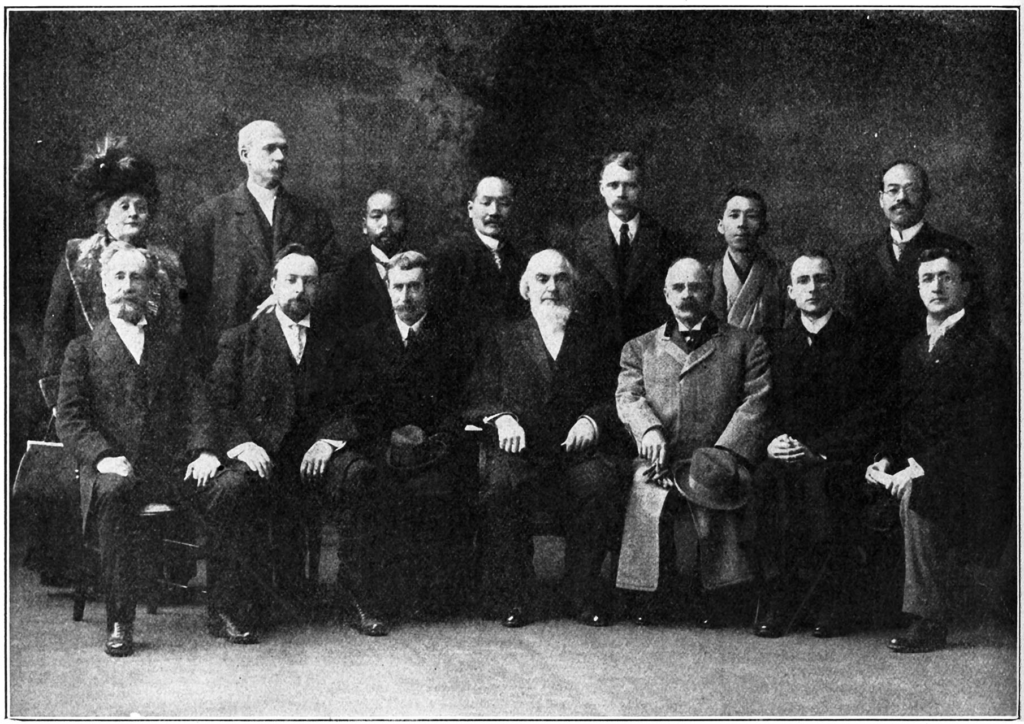
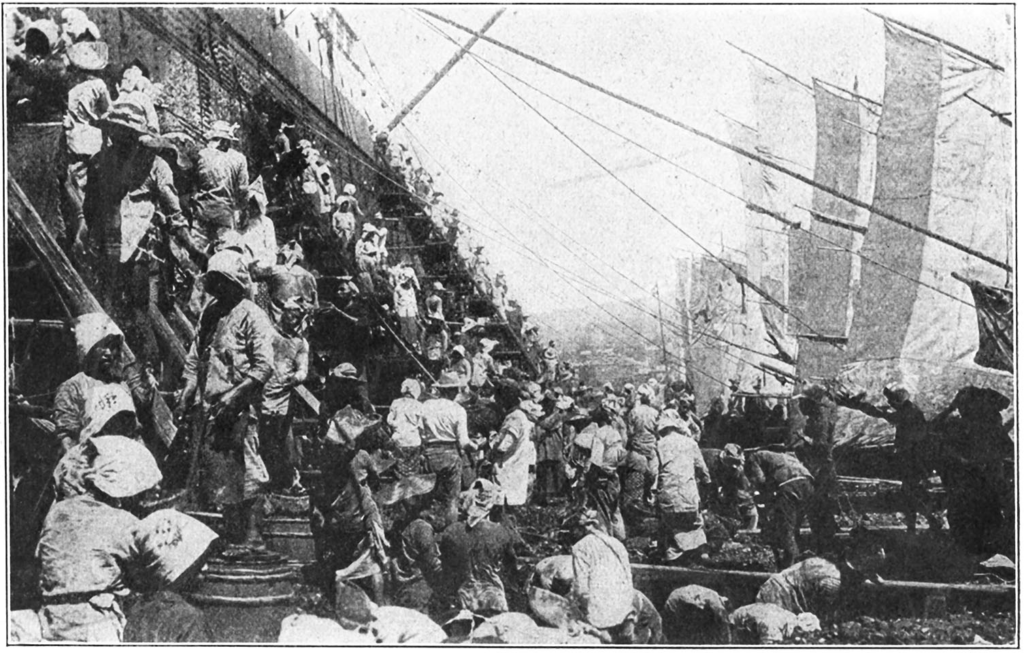
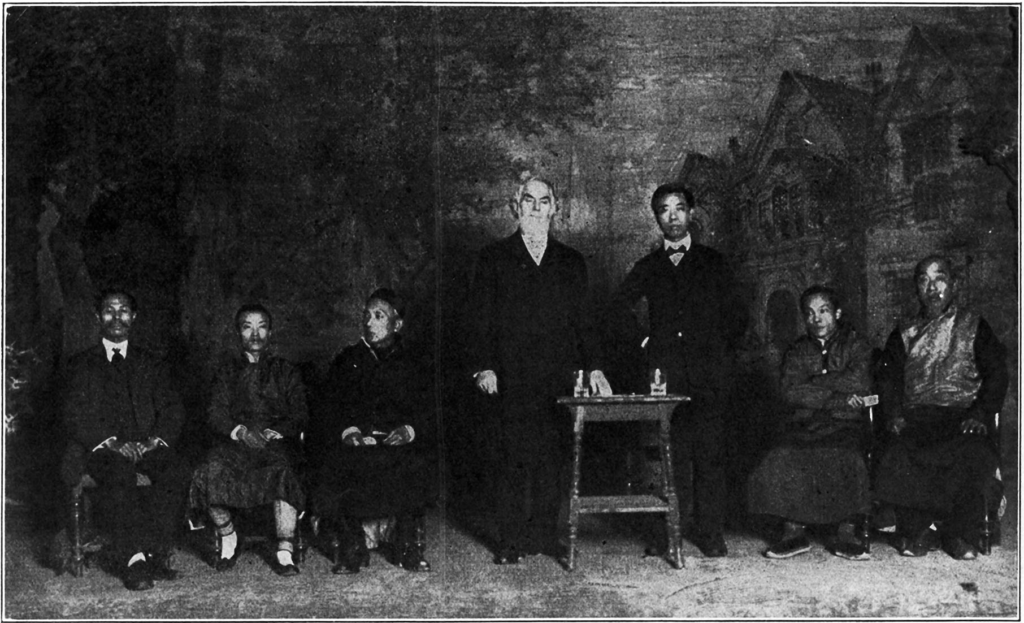
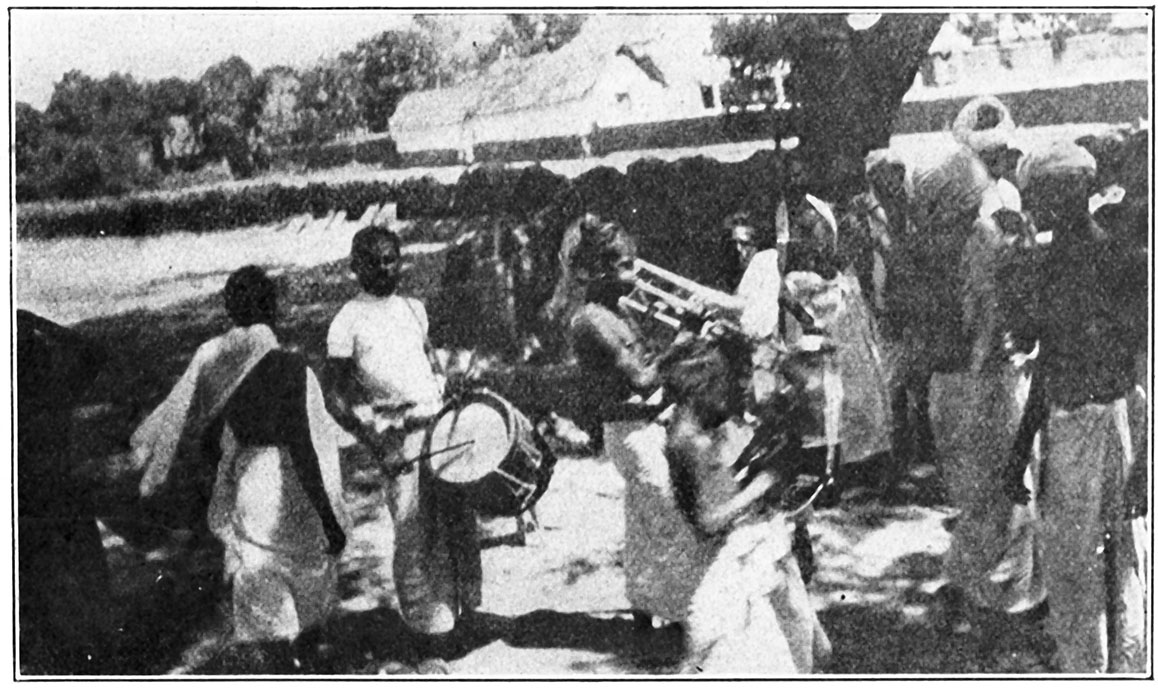
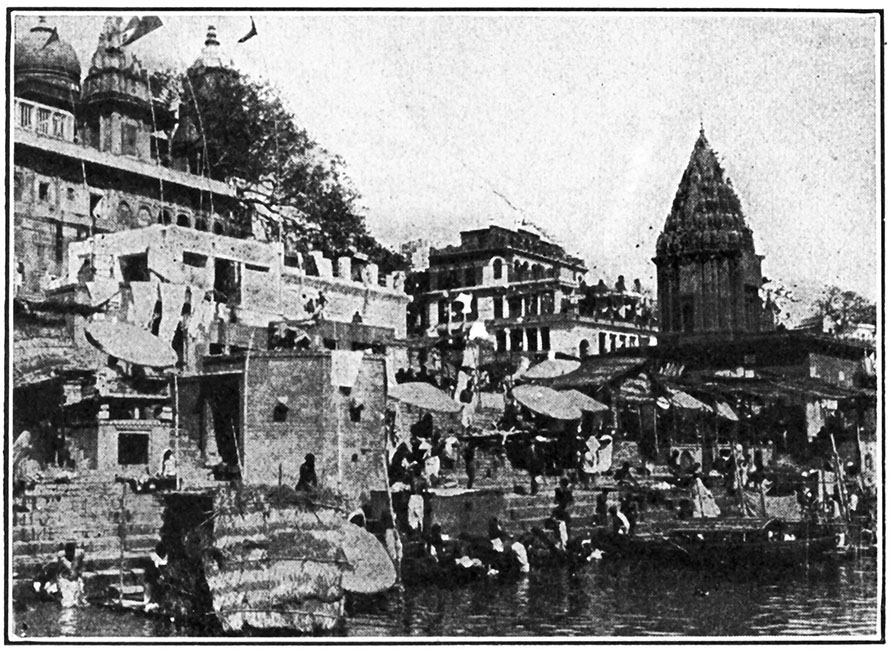
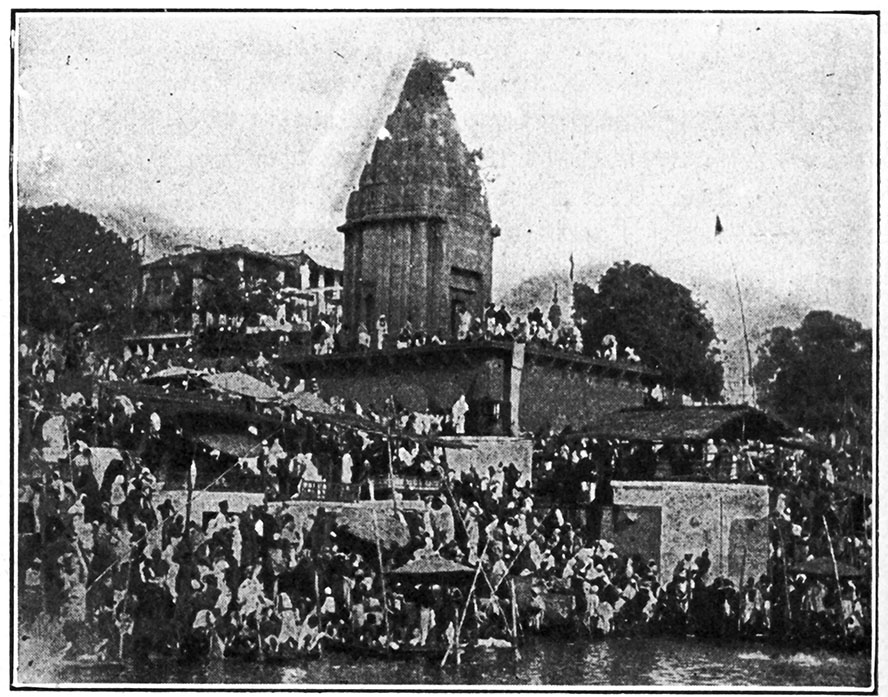
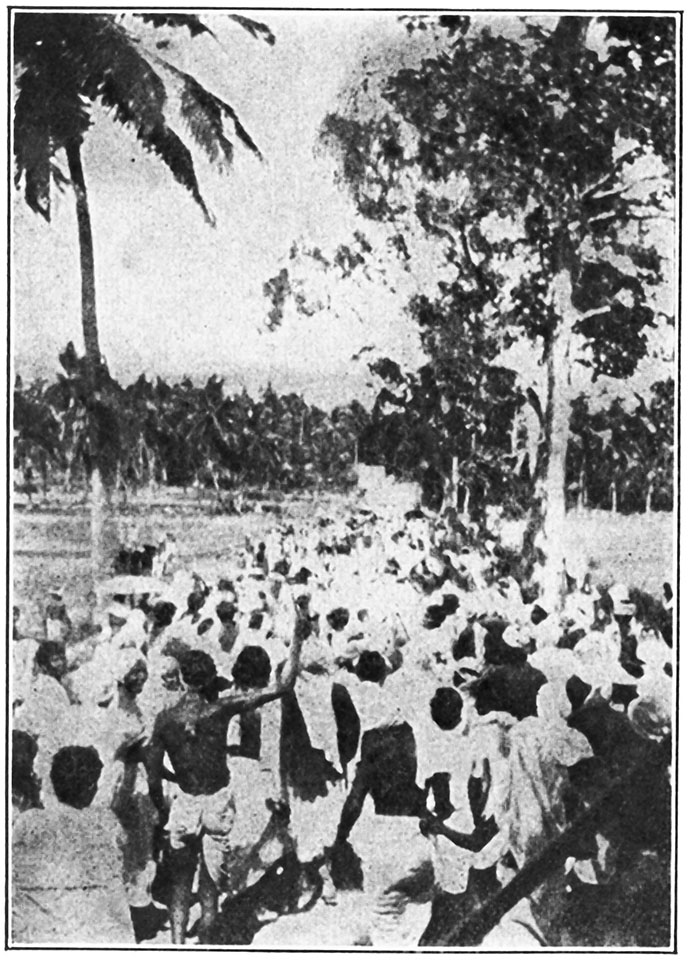
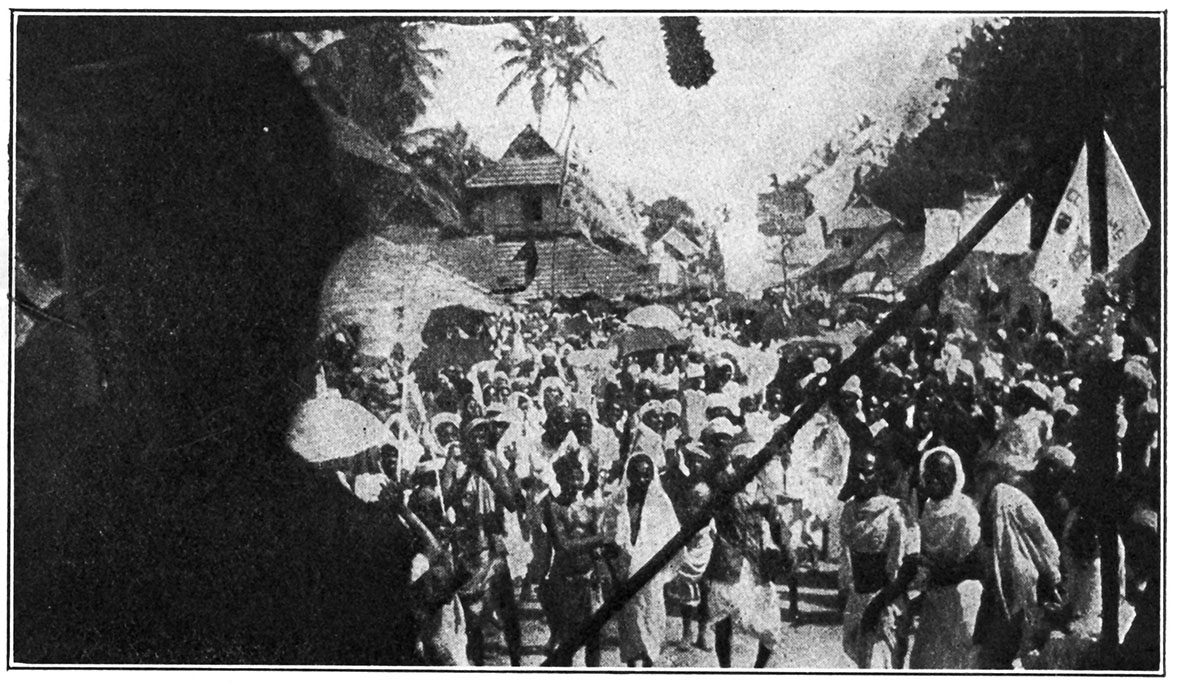
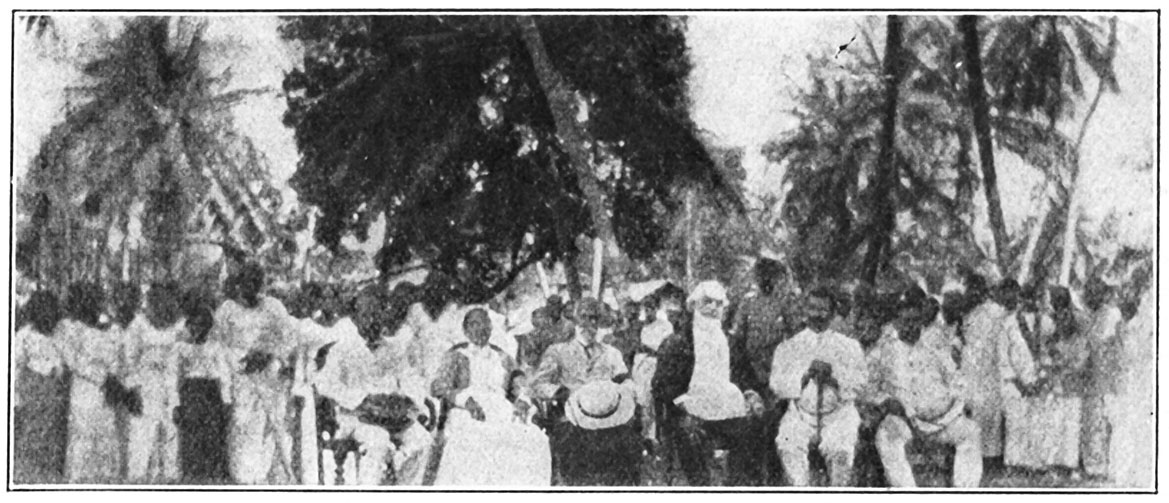
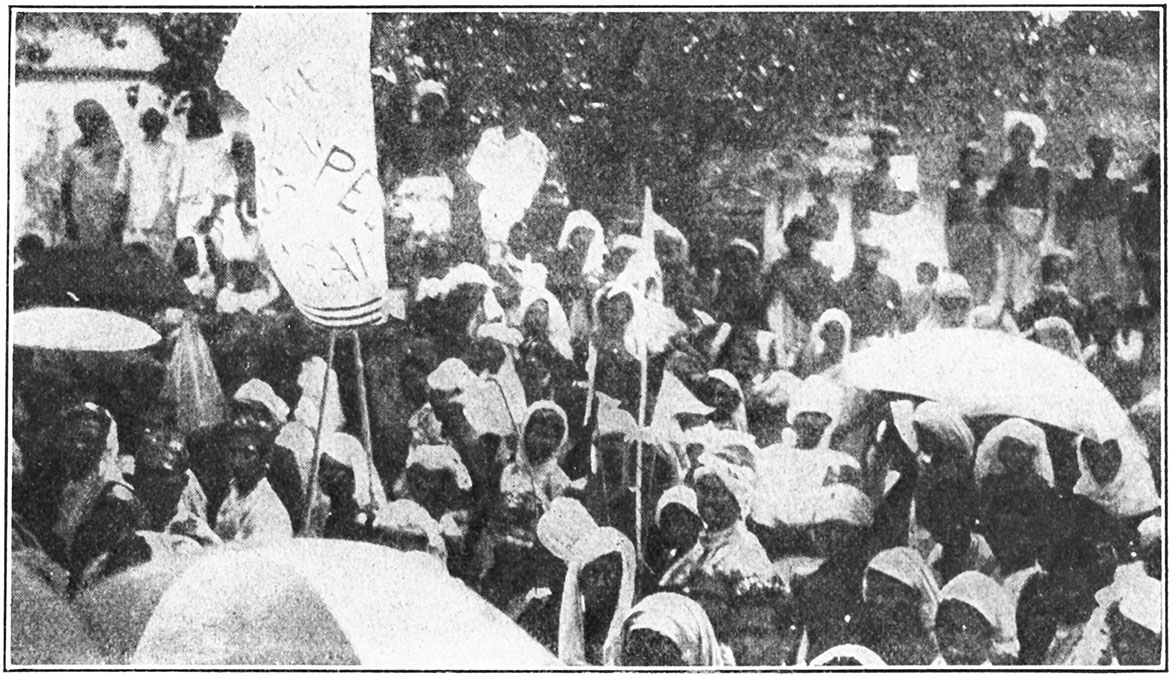
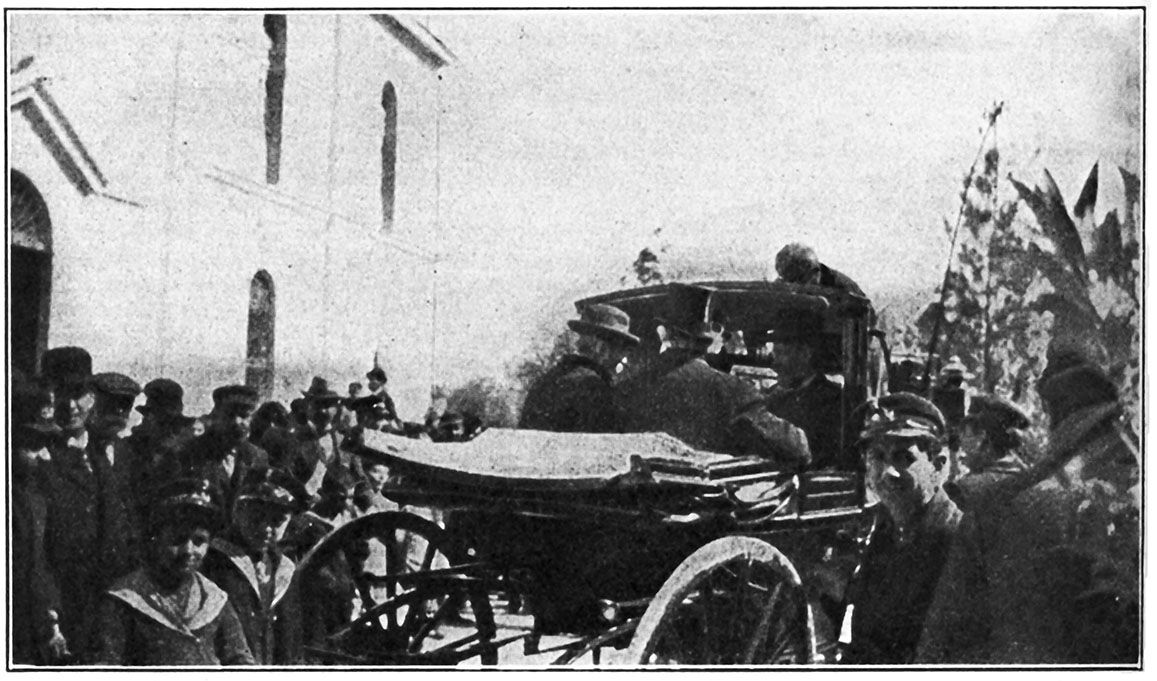
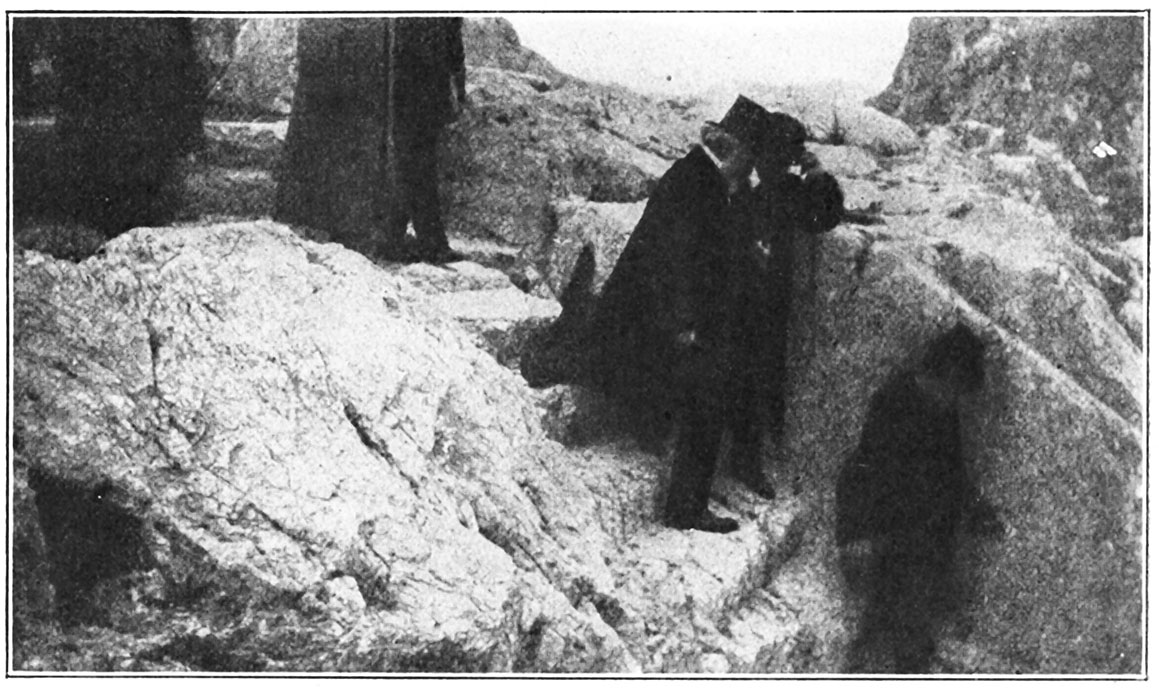



Zgłoszenie błędu w tekście
Zaznaczony tekst zostanie wysłany do naszych redaktorów: